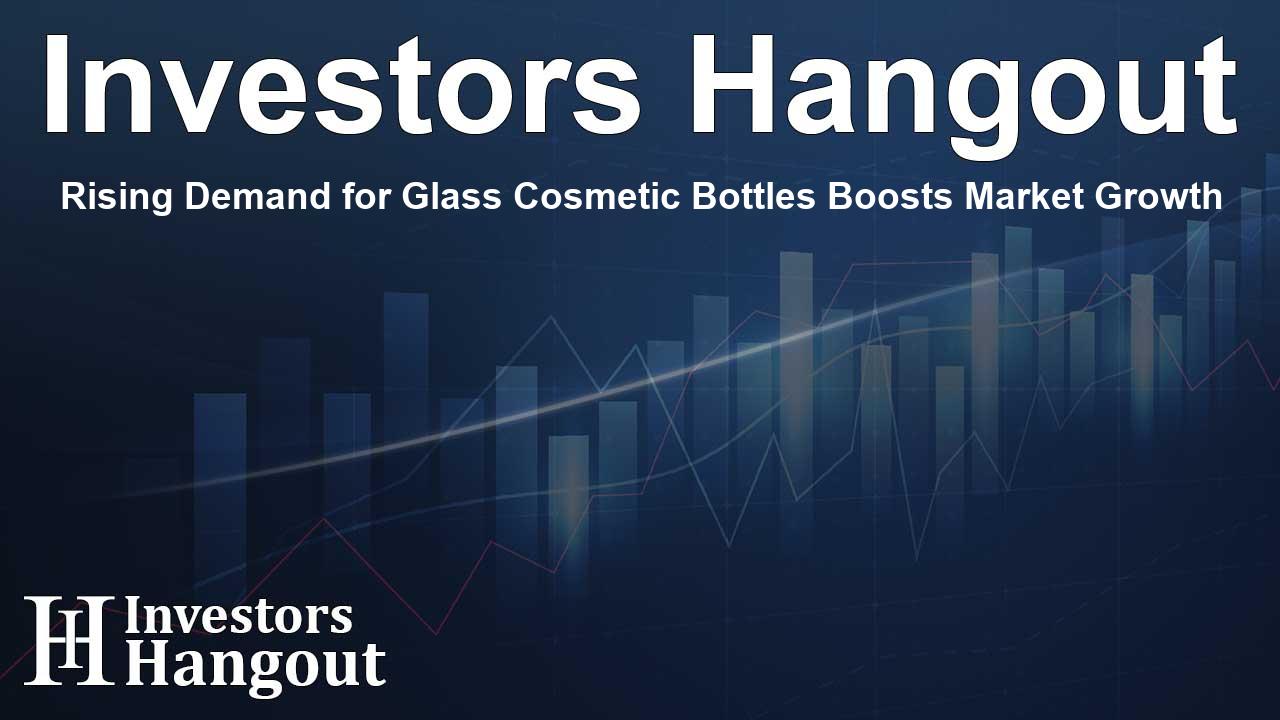Rising Demand for Glass Cosmetic Bottles Boosts Market Growth

Growth Trends in the Glass Cosmetic Bottle Market
The global glass cosmetic bottle market is currently experiencing a significant shift towards sustainable packaging options. As environmentally aware consumers demand more premium, eco-friendly choices, the market is projected to expand from USD 3,200 million in 2024 to USD 4,671.9 million by 2035, achieving a compound annual growth rate (CAGR) of 3.5% during this period.
Consumer Preferences Driving Change
One of the primary drivers of this growth is the increasing consumer preference for packages that are not only visually appealing but also sustainable. Glass bottles are becoming a favored choice for brands aiming to meet these preferences, as they offer a recyclable and reusable alternative to traditional plastic containers. The growing emphasis on sustainability is complemented by tightening regulations aimed at reducing plastic waste.
Regulatory Influences on the Industry
Governments are taking a firm stance on plastic waste management, implementing stricter regulations and encouraging the adoption of recyclable materials. As a result, brands are increasingly transitioning to glass packaging to align with these mandates. This regulatory environment is pushing cosmetic manufacturers to rethink their packaging strategies and invest in more sustainable options.
Premiumization and Aesthetic Appeal
The beauty industry is witnessing a trend of premiumization, where brands focusing on high-end products are turning to glass for its aesthetic attributes and ability to preserve product quality. Glass packaging not only enhances the luxury feel of skincare and cosmetic products but also ensures that formulations remain uncontaminated by harmful chemicals, a concern often associated with plastic.
Impact of E-Commerce and Direct Sales
The rise of e-commerce is further influencing the glass cosmetic bottle market. As more brands sell directly to consumers online, the need for standout packaging becomes crucial. Glass bottles offer a sense of elegance and sustainability that appeals to discerning customers, enhancing brand image and consumer trust.
Technological Advancements in Glass Manufacturing
Glass manufacturers are not resting on their laurels. Innovations like lightweight glass technology have emerged to address transportation and logistical challenges associated with traditional glass packaging. These developments not only help in reducing carbon emissions but also ensure that consumers are met with high-quality, aesthetically pleasing products.
Emerging Trends in Packaging
There’s a notable trend towards refillable and reusable glass packaging, which aligns with the circular economy model. This approach not only appeals to eco-conscious consumers but also offers brands an opportunity to differentiate their products in a crowded marketplace. Furthermore, advancements in smart packaging technologies, such as UV protection and interactive features, are poised to redefine consumer engagement.
Future Market Outlook
The glass cosmetic bottle market is set for sustained growth, influenced by emerging beauty brands and sustainable practices. By investing in innovative packaging solutions and aligning with consumer trends, brands can position themselves to thrive in this evolving landscape. For instance, advancements in automated production processes are streamlining manufacturing while reducing costs.
Key Players Shaping the Market
Prominent players in this sector include SGD-Pharma, Heinz-Glas, and Verescence Inc., who are at the forefront of driving quality and innovation in glass packaging. Their focus on premium aesthetics and sustainability will play a critical role in shaping the future of the glass cosmetic bottle industry.
Frequently Asked Questions
What is driving the growth of the glass cosmetic bottle market?
Growing consumer preferences for sustainable, premium products and stringent regulations on plastic waste are key drivers of this market.
How does glass packaging compare to plastic?
Glass packaging is more sustainable, recyclable, and aesthetically appealing, providing better preservation of product integrity.
What are some technological advancements in glass manufacturing?
Lightweight glass technology and smart packaging features are among the innovations improving sustainability and consumer engagement.
Who are the main competitors in the glass cosmetic bottle market?
Leading companies include SGD-Pharma, Heinz-Glas, and Verescence Inc., known for their focus on quality and sustainable packaging solutions.
What future trends should we expect in this industry?
Expect to see more refillable packaging options, advancements in smart technologies, and increased reliance on recycled materials in glass production.
About The Author
Contact Owen Jenkins privately here. Or send an email with ATTN: Owen Jenkins as the subject to contact@investorshangout.com.
About Investors Hangout
Investors Hangout is a leading online stock forum for financial discussion and learning, offering a wide range of free tools and resources. It draws in traders of all levels, who exchange market knowledge, investigate trading tactics, and keep an eye on industry developments in real time. Featuring financial articles, stock message boards, quotes, charts, company profiles, and live news updates. Through cooperative learning and a wealth of informational resources, it helps users from novices creating their first portfolios to experts honing their techniques. Join Investors Hangout today: https://investorshangout.com/
The content of this article is based on factual, publicly available information and does not represent legal, financial, or investment advice. Investors Hangout does not offer financial advice, and the author is not a licensed financial advisor. Consult a qualified advisor before making any financial or investment decisions based on this article. This article should not be considered advice to purchase, sell, or hold any securities or other investments. If any of the material provided here is inaccurate, please contact us for corrections.
